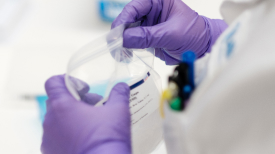- Cancer Care Team
Cancer Care Team
To deliver optimal patient outcomesProducts and Services
Cancer Type
Supplies & Tools
Scientific Focus
- Biopharma Partners
- Patients
- Education & Events
- Login
- Contact Us
Test Details
 Cancer Type
Cancer Type
Colorectal cancer (CRC), Lung, Non-small cell lung cancer
 Technology Used
Technology Used
Molecular
 Turnaround Time
Turnaround Time
5 - 7 days
Use
The therascreen KRAS RGQ PCR Kit is a real-time qualitative PCR assay used on the Rotor-Gene Q MDx (US) instrument for the detection of 7 somatic mutations in the human KRAS oncogene using DNA extracted from formalin fixed paraffin embedded (FFPE) colorectal cancer (CRC) tissue and non-small cell lung cancer (NSCLC) tissue. The therascreen KRAS RGQ PCR Kit is intended to aid in the identification of CRC patients for treatment with Erbitux® (cetuximab) or with Vectibix® (panitumumab) based on a KRAS No Mutation Detected test result. The therascreen KRAS RGQ PCR Kit is also intended to aid in the identification of NSCLC patients for treatment with LUMAKRAS™ (sotorasib) based on a KRAS G12C Mutation Detected result.
Special Instructions
Please provide a copy of the pathology report. Direct any questions regarding this test to customer service at 800-345-4363.
Limitations
Based on data in the COSMIC database (2012 v59), the seven mutations detected by the KRAS Kit account for >97% of all reported KRAS mutations in CRC patients. The KRAS G12C mutation is estimated to be present in around 13% of NSCLC cases.
Samples with results reported as "no mutation detected" may harbor KRAS mutations that are not detected by the assay.
Detection of mutation is dependent on sample integrity and the amount of amplifiable DNA present in the specimen. The methods used in this assay are highly selective and, depending on the total amount of DNA present, can detect approximately 1% to 5% of mutant DNA in a background of wild-type genomic DNA.
Methodology
Amplification refractory mutation system (ARMS) and real-time polymerase chain reaction (PCR) using Scorpions™ technology
Related Documents
Specimen Requirements
Information on collection, storage, and volume
Specimen
Formalin-fixed, paraffin-embedded (FFPE) tissue block or slides from colorectal cancer or NSCLC
Volume
Four unstained slides and one matching H&E-stained slide at 5 μM or formalin-fixed, paraffin-embedded tissue block
Minimum Volume
Two unstained slides and one matching H&E-stained slide at 5 μM. Samples with >4 mm² and ≥20% tumor content are preferred.
Container
Slides, blocks
Storage Instructions
Maintain specimen at room temperature up to 4 weeks at 15-30°C.
Causes for Rejection
Tumor block containing no tumor tissue; tumor fixed in a heavy metal fixative; broken or stained slides
Related Tests
Find more tests related to this one.





